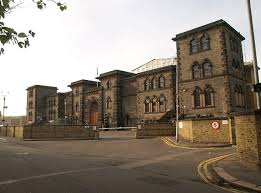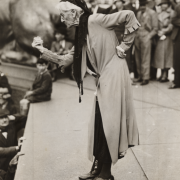MONTHLY BLOG 161, DO LOCAL PEOPLE CARE ABOUT THE DIRE STATE OF WANDSWORTH PRISON?

| Exterior View of HM Wandsworth Prison from Heathfield Road Source: Wikipedia |
Do local people care about the dire state of Wandsworth Prison, as currently reported by reliable sources? Yes, they do. Perhaps surprisingly, but certainly encouragingly, they do.
On Wednesday 10 April 2024, I attended an evening meeting at St Anne’s Church Wandsworth, called by a concerned group of local Quakers and others who were launching their Wandsworth Prison Improvement Campaign.1 The capacious venue was packed. We did not have an official register of attendance; but my own head-count made it at least 250 people. Mainly middle-aged; but with a scattering of youngsters too. All listening intently.
We heard testimonies from prison reform campaigners, the former prison chaplain, former inmates, and the relatives of people currently serving time within the Prison. It is one of the largest in the country. It was opened in 1851, initially as the Surrey House of Correction, designed to hold some 700 prisoners. In 2023 it was estimated to be holding double that – between 1,300 and 1,500 inmates, including a number of individuals who are only on remand. The guilty and the innocent alike are housed in cells that were built for one inmate and now serve two. Rats and other vermin are rife.
Moreover, because of current staff shortages, those within spend much of the time locked up in their small cells, without opportunities for exercise, recreation or socialising with anyone other than their cell-mate. Little wonder that drug abuse is reportedly rife.2 Little wonder too that incidents of violence, in the form of inmate attacks upon one another and upon staff, are reportedly rising.3 In addition, there are growing numbers of prisoners with mental health problems – and an escalating shortage of (poorly paid) staff.
The packed audience was clearly uncomfortable at some of the information provided. And also indignant. But what impressed me was the positive mood of determination, rather than a collective and hopeless despondency. People were all asking: what can we do? The answer is that we must all, in our different ways, try to shine a light onto the closed prison. It is part of our neighbourhood. It employs people who are our neighbours. A proportion of the inmates are no doubt our local neighbours too (though prisoners are also moved round the country depending upon the availability of cells to be filled). And prisoners, having served their time, also return to the communities in which we all live.
Many small acts of lobbying, writing to our MPs, attending protest meetings, spreading the word, etc. will add up to something rather more than the sum of lots of individual actions.
So overall, the evening was one that conveyed appalling and distressing information, but also one that inspired those present with civic determination to campaign for change. Great! The mood at the first anti-slavery rallies in the 1790s must have been rather similar.4 We need a national conversation about the role of prisons – and, importantly, about safe alternatives to prisons – and the vital need to rehabilitate rather than brutalise offenders, who are all fellow citizens.
Small pebbles thrown into a pond can make major waves! Good luck to the Wandsworth Prison Improvement Campaign! Its website gives helpful advice on how best to lobby MP and prison ministers. Feeling civic (as I am)? Throw a pebble and help to get urgently needed and seriously real reform.
ENDNOTES:
1 For details see https://www.wandsworthprisoncampaign.co.uk/.
2 Report on BBC News 7 Sept. 2023, ‘Wandsworth Prison Life: Decay, Drugs and Drudgery’. For context, see too https://en.wikipedia.org/wiki/HM_Prison_Wandsworth.
3 An Independent Monitoring Board was reported in Evening Standard 11 Oct. 2023, as finding conditions in the prison ‘inhumane’ and the resulting environment ‘unsafe’ for both guards and prisoners: https://www.standard.co.uk/news/london/wandsworth-prison-conditions-independent-monitoring-board-report-b1112696.html.
4 See e.g. Z. Gifford, Thomas Clarkson and the Campaign against Slavery (1996); C. Midgley, Women against Slavery: The British Campaigns, 1780-1870 (1992); and J.R. Oldfield, Popular Politics and British Anti-Slavery: The Mobilisation of Public Opinion against the Slave Trade, 1787-1807 (1998).
For further discussion, see Twitter
To read other discussion-points, please click here
To download Monthly Blog 161 please click here









